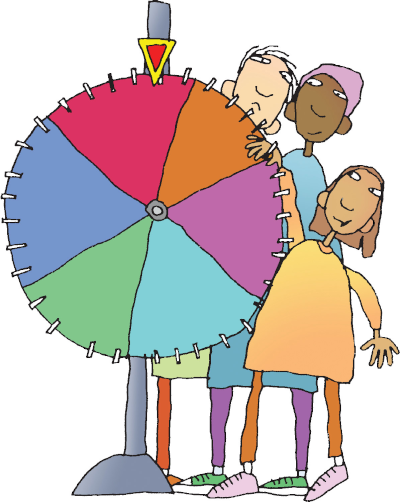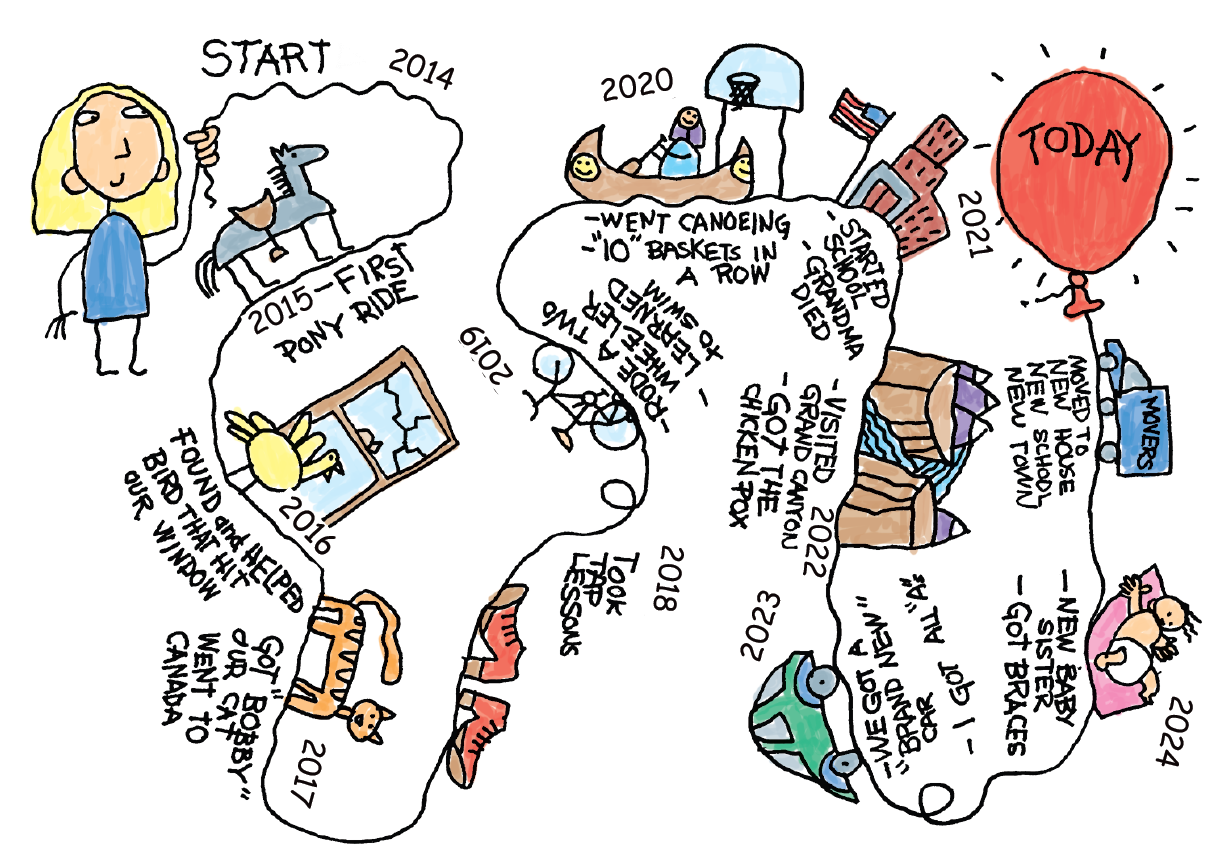Page 35
Selecting and Collecting

Have you ever tried freewriting? You just write as much as you can without stopping. How about brainstorming? You write down as many unique ideas as you can. Either way, you spin the wheel of your mind and see what you get!
Freewriting and brainstorming are powerful prewriting strategies. Prewriting is the process of going from not knowing what to write to having a head full of great ideas!
In this chapter, you’ll try clustering, sentence completion, drawing a life map, and many other strategies.
What’s Ahead
WE Page 036
Page 36
Building a File of Writing Ideas
Most writers are interesting people. They know a lot about what’s going on, and they try to save as many details from their experiences as they can. These ideas give them starting points for their writing. The activities below can help you save ideas just like your favorite authors do. Have fun!
Think and act like a writer . . .
Always keep your eyes and ears open to interesting sights and sounds. On the way to school, you might see two crazy squirrels chasing each other around a tree. In class, you might overhear someone wondering “How does lightning know where a lightning rod is?” Later at home, you might daydream about being famous someday. What would it be like to have photographers waiting outside your door? You could use any of those ideas to write a story.
Writer's Notebook
Reserve a section in a notebook or journal where you can list some of the sights and sounds you collect each day.
Keep track of your experiences . . .
Start a “This Is My Life” list and keep adding to it throughout the school year. Here’s what you might include:
- People I’ll Never Forget
- Animals I’ll Never Forget
- Important Places Near and Far
- Favorite Books and Movies
- Special Skills and Talents
- Unforgettable Moments
- Biggest Blunders
- Important Events
- Prized Possessions
- Wild Ideas
- Before and After School
Writing Ideas
Check out many more writing ideas for narrative, explanatory, persuasive, and creative writing.
WE Page 037
Page 37
Make new discoveries . . .
Get involved in as many different experiences as you can. Join teams and clubs, visit different places, and help people out. The more you do, the more you know.
Read a lot . . .
Read books, magazines, websites, cereal boxes, and whatever else you like. Jot down any names, descriptions, or ideas that jump off the page as you read. These jottings may give you ideas for your own writing.
Write a lot . . .
Explore your thoughts and feelings in a personal journal or diary, and you will always have a good supply of writing ideas.
Draw a life map . . .
Start your life map with your birth and trace it right up to the present. Choose the experiences you want to picture along the way.

WE Page 038
Page 38
Selecting a Topic
Before you can begin your topic search, be sure you understand the assignment. The PAST strategy can help you do this. Each letter in PAST stands for one of the parts—P is for purpose, A is for audience, S is for subject, and T is for type.
Let’s say your teacher gave you this assignment: Write a paragraph describing a favorite person and be ready to share this paragraph with your classmates. Here’s how the PAST strategy can be used to understand each part of this assignment.
Purpose 🟪 Why am I writing? (to describe)
Audience 🟪 Who are my readers? (my classmates)
Subject 🟪 What will I write about? (a favorite person)
Type 🟪 What form will my writing take? (paragraph)
Selecting Strategies
Once you understand the assignment, you need to select a specific subject. If you’re lucky, you may think of a topic right away. If not, look through your file of writing ideas or your writing journal. Also check “Considering Writing Topics” on pages 40–41 for ideas. If you’re still stuck, use one of the strategies that follow.
Freewriting
Write rapidly for 3 to 5 minutes. Do not stop to think during your freewriting—just write. Begin freewriting with an idea related to your assignment. As you write, a number of subjects may come to mind. (See page 42 for ideas for freewriting.)
Listing
Freely list any ideas that pop into your head when you think of your assignment. You and a classmate can help each other think of possible subjects by brainstorming and listing together.
WE Page 039
Page 39
Sentence Completion
Complete a sentence starter in as many ways as you can. Make sure that your sentence starter relates to your assignment. Here are six samples:
I remember when . . .
One place I like . . .
I wonder how . . .
I really get mad when . . .
I just learned . . .
School is . . .
The Basics of Life Checklist
All of the things you need in life appear in the Basics of Life Checklist. Thinking about these categories can help you identify writing topics.
agriculture |
education |
food |
love |
animals |
energy |
freedom |
machines |
art/music |
environment |
friends |
money |
books |
exercise |
health |
plants |
clothing |
faith |
housing |
technology |
community |
family |
laws |
work/play |
Express Yourself
Here’s how you could use this checklist in a topic search about a how-to explanation.
Category: machines
Topic: how to fly a drone
WE Page 040
Page 40
Considering Writing Topics
These writing topics are organized according to the four basic reasons to write. These ideas will be especially helpful when you need a topic for a specific kind of writing: explanations, arguments, descriptions, or narratives.
Explanations
- How to . . . study for a test, bathe a dog, earn money, saddle a horse, perform a magic trick, do a back flip, complete a skateboard stunt, shoot a free throw, write a personal blog, teach something, build something, fix something, make something, grow something
- The causes of . . . animals becoming endangered, frostbite, hurricanes, headaches, dizziness, detentions, potholes, photosynthesis, rainbows, rust, shooting stars, shin splints, stage fright, stomach growls
- Kinds of . . . music, movies, commercials, clouds, cars, video games, bikes, cats, apples, spiders, laughter, swim strokes
- The definition of . . . friendship, fairness, teamwork, courage, love, loyalty, patience, creativity, problem solver, bullying
Persuasive Arguments
Arguing for or against homework, school rules, dress codes, lunch hour, cell phones, computer lab, Internet access, activity bus, standardized tests, school cliques, bullying, progress reports, bike paths, library books, store clerks, something that needs improving, something that’s unfair, something everyone should see or do, something worth supporting
WE Page 041
Page 41
Descriptions
- People: a relative, a teacher, a classmate, a neighbor, someone you admire, a first friend, a store clerk, a crossing guard, a character on a TV show, a character in a book, a singer, a star athlete, an inventor, a parent or grandparent
- Places: your room, an attic, the gym, a classroom, an ice rink, a swimming pool, the library, a yard, a river, a park, a hideout, the cafeteria, a favorite store, a doctor’s office
- Objects or things: a poster, a stuffed animal, a computer game, a drawing, a junk drawer, a souvenir, a sandwich, a bike, a school bus, a gift, a jersey, a hat, a sweatshirt, a tree, a tree house

Personal Narratives
Getting lost, getting caught, getting stuck, making a big mistake, being surprised, making the news, learning to ________, winning, sledding or skiing, singing a solo, getting sick, taking charge, covering up, moving too fast, getting injured, making a discovery, receiving a gift, being different, visiting a relative, biking in the neighborhood, cooking, escaping, dealing with a brother or sister
“If I like my topic, the words come easily. It’s even fun to research!”
—David Marx, student
WE Page 042
Page 42
A Closer Look at Freewriting
Freewriting can help you identify writing topics. Plus, freewriting can help you collect details and make it easier for you to express yourself. Here is how freewriting works best:
Starting Out
- Write freely for at least 3 to 5 minutes. (Time yourself.)
- Begin writing about one idea—maybe the general subject for the writing assignment.
- Or you can begin with one of the topics on pages 40–41.
- Do not stop to make changes.
- Keep writing even when you can’t think of anything. Write, “I guess I’ll keep writing until another idea comes to mind.”
- Write about a certain topic as long as you can before you go on to something else.
Following Up
- Review your writing and underline ideas that relate to your assignment or that you just like.
- Team up with a classmate and read each other’s freewriting. Identify at least one idea that you like in your partner’s writing.
- Consider using one of your favorite ideas as a topic for your assignment.
- Continue freewriting about ideas related to your assignment or ideas that simply interest you.
Freewrite
If you freewrite two or three times a week, you should see an increase in the number of words that you can write in the time you’ve set aside.
- Review your writing and underline ideas that relate to your assignment or that you just like.
- Team up with a classmate and read each other’s freewriting. Identify at least one idea that you like in your partner’s writing.
- Consider using one of your favorite ideas as a topic for your assignment.
- Continue freewriting about ideas related to your assignment or ideas that simply interest you.
Freewrite
If you freewrite two or three times a week, you should see an increase in the number of words that you can write in the time you’ve set aside.
WE Page 043
Page 43
Collecting Details
If you already know a lot about a topic, you won’t need to collect many additional details. On the other hand, for new topics, you may need to use two or three collecting strategies. You can choose from the strategies listed below and on page 44.
Additional Freewriting
Write freely for at least 3 to 5 minutes about your topic. This writing will help you see how many details you already know.
Listing
Make a list of ideas related to your topic. Keep listing as long as you can. (You can ask someone else to add to your list.)
5 W’s and H of Writing
Answer the 5 W’s and H—Who? What? When? Where? Why? and How? to collect basic information and additional details about your topic.
Additional Clustering
Write your specific topic in the middle of a piece of paper. Then cluster related words and ideas around it. (See page 39.)
Critical Thinking
Think carefully about your topic by answering two or three of these questions.
- What do I see, hear, or feel about it? (Describe it.)
- What is it like? What is it different from? (Compare/contrast it.)
- What can I do with it? How can I use it? (Apply it.)
- What parts does it have? How does it work? (Analyze it.)
- What are its strengths and weaknesses? (Evaluate it.)
Creative Thinking
Think creatively about your topic by answering a few offbeat questions about it. Here are some examples.
- What type of clothing is the person like?
- What does this place like to do?
- What movie is this experience like?
WE Page 044
Page 44
Research Your Subject
Sometimes you will need to gather facts from other resources. This is especially important for essays and reports.
Reading
Learn facts and details by reading about your subject in books and magazines and on websites.
Viewing and Listening
Watch TV programs, slide shows, and videos about your subject.
Online Researching
Explore the Internet for reliable, up-to-date information. (See pages 299–307.)
Interviewing
Ask an expert questions about your topic.
Discussing
Talk with classmates and other people about your topic.
Using a Gathering Grid
Use a gathering grid like the one below to keep track of all of your gathering notes. (See the finished gathering grid in “Writing Research Reports,” page 257.)
|
Subject |
Questions About Your Topic |
Sources of Information |
Your Answers |
|
Who? |
What? |
When? |
Where? |
Why? |